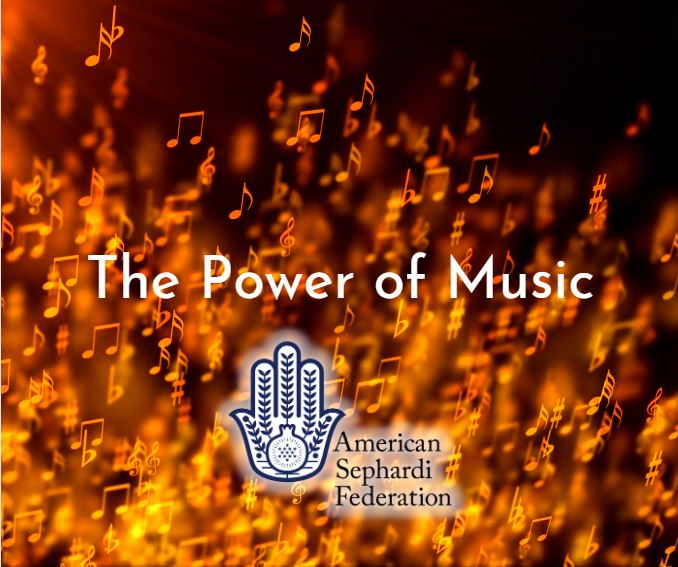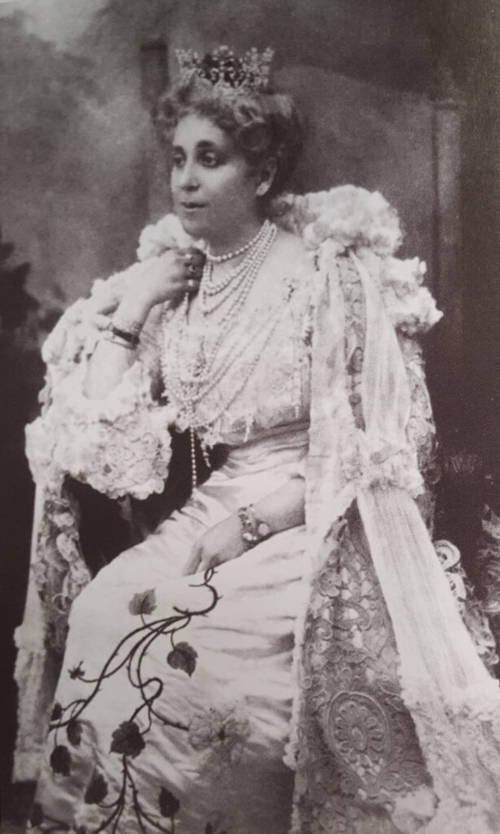The Power of Music 🎶

In Honor of Stella Levi, a native Ladino speaker and member of the Board of Directors of Centro Primo Levi NY, who was born on the Island of Rhodes. On 23 July 1944, Stella, her immediate family, and the entire Jewish community of Rhodes (1,870 people) were deported to Auschwitz. Stella has worked for decades to reconstruct and preserve Sephardic and Italian Jewish life and traditions, offering her knowledge, guidance, and dedication to the Jewish Museum of Athens, the Jewish Museum of Rhodes, the Museum of Kehilah Kedoshah Janina, and the American Sephardi Federation. Stella’s conversations with Michael Frank are the subject of a new Simon & Schuster book, “One Hundred Saturdays: Stella Levi and the Search for a Lost World,” recipient of the Jewish Book Council’s Natan Notable Book Award.
Click here to dedicate a future issue in honor or memory of a loved one

The American Sephardi Federation’s Sephardi Ideas Monthly is a continuing series of essays and interviews from the rich, multi-dimensional world of Sephardi thought and culture that is delivered to your inbox every month.
This month Sephardi Ideas Monthly (SIM) explores the Tanakh’s (Bible’s) teaching regarding the mysterious, intense, and ambiguous power of music. As detailed below, the ASF is thoughtfully using the power of music to shape a more resilient and humanistic vision for the future of American culture.
In his 1987 best-seller, The Closing of the American Mind, Allan Bloom noted that for Americans “this is the age of music and the states of soul that accompany it.” Always and everywhere available, music can move the irrational and spirited parts of our souls like no other power, for better and for worse. Music’s power shows up far beyond the shores of the United States, as well. For instance, ASF NYSJFF Pomegranate Awardee André Azoulay, Senior Adviser to King Mohammed VI of Morocco, showed how music can be put to noble political use by orchestrating a kind of “musical diplomacy” in the years leading up to the recent re-establishment of diplomatic relations between Israel and the Kingdom, deepening the connection between Israeli and Moroccan societies through music festivals that viscerally illustrated the depths of the Moroccan-Jewish cultural bond. As Azoulay offered to Al Arabiya during a 2009 music festival in Essaouira:
This festival is not some kind of fantasy, or a nostalgic look at a golden age of Essaouira… The music you hear is a reality in the hearts and minds of millions of Moroccans, both Jews and Muslims.
How can we understand music’s intense and ambiguous power? For his part, Bloom turned for guidance to an old political-philosophical tradition that takes seriously the power of music in shaping the character of individuals and societies, from Plato and Aristotle to Rousseau and Nietzsche. This month, Sephardi Ideas Monthly features an essay written by the ASF’s Director of Publications, Dr. Aryeh Tepper, that initiates a dialogue between the Tanakh and this classical political-philosophical tradition and that delineates the Bible’s sophisticated teaching regarding music’s ambiguous power, “The Problematic Power of Musical Instruments in the Bible” (Interpretation, Vol. 41:2-3, 2014-15).
In Tepper’s reading, the Tanakh points both to the problematic origins of music as well as to music’s potentially elevated use. In order to see the Bible’s teaching, however, we need to get the Sunday School vision of the Tanakh out of our minds and to follow the text’s themes and their variations from Bereshit (Genesis) through Sefer Melakhim (Books of Kings) and Divrei HaYamim (Chronicles). The Tanakh is, in part, a book of reason that advances arguments about the nature of the good life, including the role of music in our lives. It begins with music’s low origin but ends with King David’s noble institution of the Levitical musical service in the Temple and the creation of a new musical-spiritual elite. As Tepper writes:
It is an amazing fact and a cause for wonder that in the Bible, the spiritual elite of Israel are temple musicians. This rather startling fact about the Bible should, however, ring familiar to modern Westerners who are familiar with the outsized role that music plays for many in shaping their notions of identity. And not only identity. Many Westerners, religious and secular alike, turn to music for spiritual sustenance—to get the ‘big feeling’. The Tanakh validates the authenticity of these experiences—Israel’s spiritual elite were temple musicians—but it resists the temptation to idealize them. That combination is not completely in tune with contemporary sensibilities, and it is thus a helpful place to start thinking about the problematic character and potential nobility of music.
These are not abstract truths. Last October, 2021, concerned by the growth of illiberal forces on the Left and the Right, the ASF, the Jazz Leadership Project (JLP) and the Combat Antisemitism Movement (CAM) came together to fight racism and antisemitism by celebrating and augmenting the cultural complement to the Civil Rights Movement, the “Omni-American” tradition of music and letters that emphasizes “character and culture, not color.”
The term “Omni-American” is borrowed from the writings of Albert Murray, the great 20th century American writer who, together with friends and students like Ralph Ellison, Romare Bearden, Stanley Crouch, Greg Thomas (CEO and Co-Founder of the Jazz Leadership Project) and Wynton Marsalis (the Grammy Award-winning Artistic Director of Jazz at Lincoln Center), celebrated excellence as the standard for America’s “incontestably mulatto” culture and drew ideas and inspiration from the American Jazz tradition. American and Israeli-born Jews have also made wonderful contributions to this great American tradition, and next month, on Nov. 28th , the ASF, the JLP, and CAM will usher in chapter two of our cultural collaboration with an evening of music, poetry, and stimulating thought at Minton’s Jazz Club in Harlem. Additional programming and publications will follow.
In the meantime, on Nov. 10th, Aryeh Tepper will offer an online presentation as part of the University of Arizona’s Voices of Culture Series, “The Omni-American Tradition, from Jean Toomer to Wynton Marsalis,” in which he will:
…delineate a spirited American tradition of letters and music created by Black Americans that dates back to the 1920s, rejects the pathology of race, and provides “equipment for living” for anyone wishing to aim high in a liberal-democratic society. Along the way, Tepper will offer a new perspective on the historic “Black-Jewish” alliance against bigotry. (Details below)
Sephardi Ideas Monthly looks forward to combatting racism and antisemitism—we’re down for the fight—through a vision of American cultural vitality that derives deep strength from the power of music. In this context, we are very happy to share with our readers Dr. Aryeh Tepper’s exploration of the Tanakh’s sophisticated teaching regarding music’s immense and mysterious power, “The Problematic Power of Musical Instruments in the Bible.”
For further reading and viewing:
“Leo Strauss, Bigotry and the Blues”
Aryeh Tepper argues that a society without bigotry is a utopian dream and explores why a German-Jewish political philosopher, Leo Strauss, and a (Black) American polymath, writer and cultural critic, Albert Murray, both believed that the rational and spirited response to bigotry is to view opposition as an opportunity to strengthen one’s resilience and commitment to excellence.
“Stanley Crouch, A Personal Remembrance and Appreciation”
Aryeh Tepper remembers Stanley Crouch, a student of Albert Murray and first-rate American writer and cultural critic who opposed crass commercialism with an American tradition, rooted in jazz, that aspires to nobility.
“Shaping an Omni-American Future: Stomping the Blues of Racial Essentialism”
Day One of our October, 2021, event celebrating the Omni-American tradition of music, writing and thought, featuring a fascinating array of musicians, writers, scholars, artists and activists. Wynton Marsalis and Representative Ritchie Torres were honored, respectively, with the Albert Murray Award for Omni-American Excellence and The Omni-American Young Leaders Award.
~~~~~~~
Please support the ASF with a generous, tax-deductible contribution so we can continue to cultivate and advocate, preserve and promote, as well as educate and empower!
Make checks payable to “American Sephardi Federation” @ 15 West 16th Street, New York, NY, 10011.
Email us at info@americansephardi.org if you are interested in discussing donating securities or planned giving options with a financial professional from AllianceBernstein.
~~~~~~~

The Monthly Sage החכם החודשי

(Photo courtesy of HeHaCham HaYomi)
Madam Frecha-Flora Sassoon was born in Bombay after her family emigrated from Iraq to India. Sassoon’s remarkable education included private tutors, “Baghdadi” rabbis, and enrollment at a local Catholic school. By the age of 17 she was a master of Jewish texts and seven languages.
Sassoon married in 1876 and had three children. She took over the family business when her husband passed away in 1894, and she proved to be a generous philanthropist during the plague of 1896. She was also a fierce proponent of women’s rights in a very conservative society. When Sassoon moved to England in 1901 in search of medical care for her daughter, she travelled with ten men so that she could pray with a proper quorum. She also brought along a shohet, or ritual slaughterer, so that she could always have kosher food!
When, in 1910, Sassoon visited Baghdad, she met with local sages, including Hakham Ezra Ruben Dangoor, the Chief Rabbi of Baghdad, and she read the Torah in the synagogue from a scroll that had been donated by the Sassoons.
Madam Frecha-Flora Sassoon left a lasting legacy by locating and collecting manuscripts written by Jews from across the east. Today, the Sassoon Collection is one of the most important manuscript collections in the field of Jewish Studies. After years of toil, Sassoon unsurprisingly developed into an expert in Oriental Jewish manuscripts, Midrash, and Sephardi customs and legal practices. She corresponded with leading rabbis, including the legendary Hakham Rabbi Yosef Haim (the Ben Ish Hai) on halakhic topics.
Sassoon was buried on Jerusalem’s Mount of Olives after she passed away in 1936. In the following passage from Sermon of the Great Rabbanit Madam Frecha Sassoon, published in London in 1930, Sassoon learnedly (and sardonically) asserts her love of Torah and the rights of women to lead learned assemblies:
First, I offer my deep thanks to the Beit HaMidrash L’Darshanim committee for their great honor in electing me as Chairperson of the Annual Meeting. I have been told that since the founding of this institution, it has been unheard of that a woman be honored as Chairperson. This is perhaps because it says “I have found no woman among all these”, or because you recite “Who hath not made me a woman” in your daily prayers. If so, I find it puzzling that you have honored me as Chairperson. Perhaps this is according to what it says in Tractate Kritot, page 6b, that “Once in sixty or seventy years the surplus would reach half the amount” (a reference to the Incense Offering). For, to your mind, men are the basis and principle of the human species, and woman are only the surplus, something extra and inessential. Just as the incense made of the surplus once in sixty or seventy years was legitimate, so you must have said: This Beit Midrash was founded seventy years ago, and was always chaired by men – they are the essence, and now, once in seventy years, the time has come to give the honor to a woman, one of the gender that is considered as surplus and not essential. I harbor no grudge toward you for the honor you have bestowed upon me, far from it; I rejoice that you have, once in seventy years, also honored a woman. Nevertheless, I will have you note that this fact is not a good sign…. Hear me, o teachers and pupils, I hereby reveal to you that you have not entirely erred. I am for the LORD, I love the Torah with all my soul and labor at it, and I lead my children, as well, in the way of Torah.
~~~~~~~

A Pizmonim: Sephardic-Hebrew Songs of the Middle East, Volume 1
By David Elihu Cohen
Pizmonim, a unity of poetry and song, have been an integral part of the Jewish People and may be traced in the Bible to the very beginning of our history.
The twelve selected Pizmonim contained in this booklet serve to perpetuate the Greater Sephardic culture and tradition of singing praise to the Lord on all joyous occasions.
By Dr. Hélène Jawhara Piñer, a 2018 ASF Broome & Allen Fellow
In this extraordinary, award-winning and best-selling cookbook now in its 4th imprint, chef and scholar Hélène Jawhara-Piñer combines rich culinary history and Jewish heritage to serve up over fifty culturally significant recipes. Steeped in the history of the Sephardic Jews (Jews of Spain) and their diaspora, these recipes are expertly collected from such diverse sources as medieval cookbooks, Inquisition trials, medical treatises, poems, and literature. Original sources ranging from the thirteenth century onwards and written in Arabic, Spanish, Portuguese, Occitan, Italian, and Hebrew, are here presented in English translation, bearing witness to the culinary diversity of the Sephardim, who brought their cuisine with them and kept it alive wherever they went. Jawhara-Piñer provides enlightening commentary for each recipe, revealing underlying societal issues from anti-Semitism to social order. In addition, the author provides several of her own recipes inspired by her research and academic studies.
Each creation and bite of the dishes herein are guaranteed to transport the reader to the most deeply moving and intriguing aspects of Jewish history. Jawhara-Piñer reminds us that eating is a way to commemorate the past.
~~~~~~~
Upcoming Events or Opportunities
The American Sephardi Federation, the Seattle Jewish Theatre Company, and the Sephardic Jewish Brotherhood of America present:
“ARRIVALS”
A Jewish Romeo & Juliet love story based on historical events.
A hit in Seattle, coming to New York.
(Written and Directed by Art Feinglass)
When the first Sephardic Jew arrived in Seattle in 1902, not everything went as planned. Marco Cordova, a young Sephardic Jew from Turkey, came to America to make his fortune. Bayla Keigelman, a fragile Ashkenazi girl from Russia, arrived fleeing a pogrom. Their meeting seemed written in the stars until tradition declared their love forbidden.
Tuesday, 1 November at 8:00 PM EST
Thursday, 3 November at 8:00 PM EST
Sunday, 6 November at 3:00 PM EST
Sign-up Now!
The Center for Jewish History
15 W 16th Street
New York City

“Arrivals tells the Sephardic story with great drama, humor and warmth.”
Rabbi Simon Benzaquen, Congregation Ezra Bessaroth, Seattle, WA
“Everyone in the audience was engaged and enjoyed the show.”
Aaron Petersen, President , Temple Beth El, Tacoma, WA
“A tour de force!”
Rabbi Emeritus James Mirel, Temple B’nai Torah, Bellevue, WA
Sponsorship opportunities available:
~~~~~~~
The ASF Institute of Jewish Experience presents:
Exclusive Authors Series with Andrée Aelion Brooks and Ruth K. Abrahams
Join us for an episode of our Exclusive Authors Series with Andrée Aelion Brooks and Ruth K. Abrahams discussing her book The Remarkable Life of Luis Moses Gomez.
Tuesday, 1 November at 12:00PM EST
(Complimentary RSVP)
Sign-up Now!

About the book:
During the early days of colonial America, a number of Sephardic Jews and conversos came from the Caribbean islands to the eastern seaboard for economic opportunity. They have largely been overlooked as the stories of the later German and Ashkenazi Jewish immigrants, took over in terms of numbers and achievements. Here is the story of one of those early Sephardic settlers who came from Jamaica to the New York area in search of such opportunities.
About the authors:
Andrée Aelion Brooks is a journalist, author and lecturer specializing in Jewish history. Formerly a contributing columnist for the New York Times, she is an Associate Fellow, Yale University, and founder of the Women’s (political) Campaign School at Yale. Her award-winning books include a comprehensive biography of Dona Gracia Nasi, a Jewish leader who was the richest woman in Renaissance Europe; Russian Dance, about a Jewish Bolshevik spy; Out of Spain, a children’s program in Sephardic history. She was honored in 2013 by the Connecticut Women’s Hall of Fame.
Executive Director of the Gomez Mill House Foundation from 1999-2017, Dr. Ruth Abrahams also served as Executive Director of the Lehman College Foundation and Vice President for Advancement at Pratt Institute. Artistically, Dr. Abrahams sang professionally in New York from 1967-1980. She received an M.A. in Humanities (Japanese Studies), and a Ph.D. in Dance History from New York University, where she taught as adjunct associate professor from 1982-1996. She was a founding member and first president of World Dance Alliance-Americas, an international advocacy organization for dance.
Click here for more about the book.
Sponsorship opportunities available:
~~~~~~~
Voices of Culture presents:
Equipment for Living
The Omni-American Tradition, from Jean Toomer to Wynton Marsalis
Music performances by UArizona professors Fanya Lin (Piano) and Edward Goodman (Saxophone)
Dr. Tepper will delineate a spirited American tradition of letters and music created by Black Americans that dates back to the 1920s, rejects the pathology of race, and provides “equipment for living” for anyone wishing to aim high in a liberal-democratic society. Along the way, he’ll offer a new perspective on the historical ‘Black-Jewish alliance’ against bigotry.
Thursday, 10 November at 12:00PM EDT
Join via Zoom
Meeting ID: 833 2748 1459
Schedule:
9:45AM – Zoom Portal Opens
10:00AM – Event Begins: Pre-talk Music featuring Fanya Lin (piano) and Eddie Goodman (saxophone)
10:20AM – Introduction to the Voices of Culture, topic of the present talk, and featured musical piece
10:30AM – Featured musical piece (5 minute)
10:40AM – Speaker Introduction (bio and preface remarks)
10:45AM – Speaker presentation
11:30AM – Q&A moderated by Daniel Asia
11:45AM – Closing remarks and music

About the speaker:
Aryeh Tepper is the Director of Publications at the American Sephardi Federation and a research fellow at Ben Gurion University. Dr. Tepper will delineate a spirited American tradition of letters and music created by Black Americans that dates back to the 1920s, rejects the pathology of race, and provides “equipment for living” for anyone wishing to aim high in a liberal-democratic society.
~~~~~~~
The ASF Institute of Jewish Experience presents:
Exclusive Authors Series with Sarina Roffé
Join us for an episode of Exclusive Authors Series with Sarina Roffé as she discusses her book Branching Out from Sepharad.
Tuesday, 15 November at 12:00PM EST
(Complimentary RSVP)
Sign-up Now!

About the book:
In Branching Out from Sepharad, readers will follow the history of Jewish life in Hispania, Spain, the Middle East and the Americas as Sarina Roffé links three rabbinic dynasties from the 11th Century to the present day, all with an Irish Converso Twist.
About the authors:
Sarina Roffé is a professional genealogist, editor of the journal DOROT, and founder of the Sephardic Heritage Project. She is the author of Branching Out From Sepharad (Sephardic Heritage Project, 2017), which outlines the history of Jews in Spain, the 1492 expulsion, their history in Syria, and their immigration to the Americas. She is Co-Chair of the Brooklyn Jewish Historical Initiative, and Chair of the JewishGen Sephardic Research Division.
Sarina is also the author of Backyard Kitchen: Mediterranean Salads, Backyard Kitchen: the Main Course, and a cooking app called Sarina’s Sephardic Cuisine, available in the Apple Store, as well as hundreds of articles. Sarina presents often at IAJGS Conferences and has completed over a dozen genealogies, through her genealogy consulting business, Sephardic Genealogical Journeys.
Click here for more about the book.
Sponsorship opportunities available:
~~~~~~~
The ASF Institute of Jewish Experience presents:
Exclusive Authors Series with Alan Verskin
Join us for this episode of Exclusive Authors Series with Alan Verskin discussing his new book “A Vision of Yemen.”
Tuesday, 6 December at 12:00PM EDT
(Complimentary RSVP)
Sign-up Now!

About the book:
n 1869, Hayyim Habshush, a Yemeni Jew, accompanied the European orientalist Joseph Halévy on his archaeological tour of Yemen. Twenty years later, Habshush wrote A Vision of Yemen, a memoir of their travels, that provides a vivid account of daily life, religion, and politics. More than a simple travelogue, it is a work of trickster-tales, thick anthropological descriptions, and reflections on Jewish–Muslim relations. At its heart lies the fractious and intimate relationship between the Yemeni coppersmith and the “enlightened” European scholar and the collision between the cultures each represents. The book thus offers a powerful indigenous response to European Orientalism.
This edition is the first English translation of Habshush’s writings from the original Judeo-Arabic and Hebrew and includes an accessible historical introduction to the work. The translation maintains Habshush’s gripping style and rich portrayal of the diverse communities and cultures of Yemen, offering a potent mixture of artful storytelling and cultural criticism, suffused with humor and empathy. Habshush writes about the daily lives of men and women, rich and poor, Jewish and Muslim, during a turbulent period of war and both Ottoman and European imperialist encroachment. With this translation, Alan Verskin recovers the lost voice of a man passionately committed to his land and people.
About the authors:
Alan Verskin is Associate Professor of History at the University of Rhode Island.
Click here for more about the book.
Sponsorship opportunities available:
~~~~~~~
ASF Broome & Allen & ADL Collaborative for Change Fellow Isaac de Castro presents:
Entre Diasporas: Telling the Latin-American Jewish story. Contando la historia judía latinoamericana

Tell your story. Cuenta tu historia.
We’re looking for first-generation Latino Jews in the United States who immigrated because of political and social turmoil. Jews of Sephardic descent from Colombia, Cuba, and Venezuela that now reside in the Miami area will be given priority, but others are welcome to apply as well.
Fill out this form to be considered as an interviewee for this project. After you’ve submitted, we will be in touch promptly to set up a preliminary phone call.
Click here for more information.